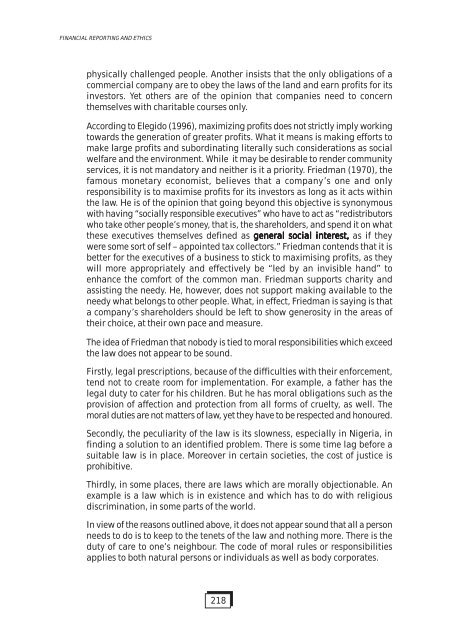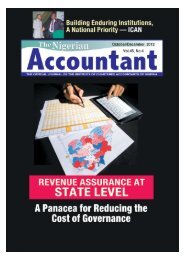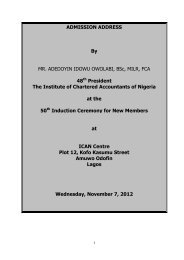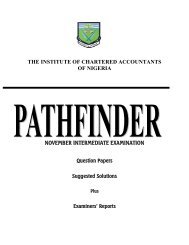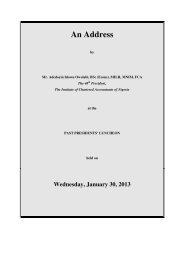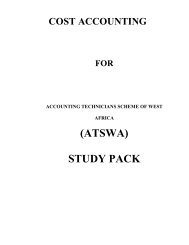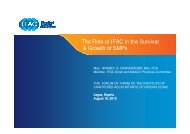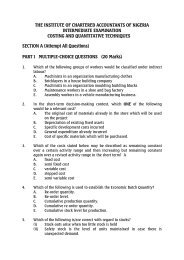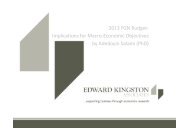Financial Reporting and Ethics - The Institute of Chartered ...
Financial Reporting and Ethics - The Institute of Chartered ...
Financial Reporting and Ethics - The Institute of Chartered ...
- No tags were found...
You also want an ePaper? Increase the reach of your titles
YUMPU automatically turns print PDFs into web optimized ePapers that Google loves.
FINANCIAL REPORTING AND ETHICSphysically challenged people. Another insists that the only obligations <strong>of</strong> acommercial company are to obey the laws <strong>of</strong> the l<strong>and</strong> <strong>and</strong> earn pr<strong>of</strong>its for itsinvestors. Yet others are <strong>of</strong> the opinion that companies need to concernthemselves with charitable courses only.According to Elegido (1996), maximizing pr<strong>of</strong>its does not strictly imply workingtowards the generation <strong>of</strong> greater pr<strong>of</strong>its. What it means is making efforts tomake large pr<strong>of</strong>its <strong>and</strong> subordinating literally such considerations as socialwelfare <strong>and</strong> the environment. While it may be desirable to render communityservices, it is not m<strong>and</strong>atory <strong>and</strong> neither is it a priority. Friedman (1970), thefamous monetary economist, believes that a company’s one <strong>and</strong> onlyresponsibility is to maximise pr<strong>of</strong>its for its investors as long as it acts withinthe law. He is <strong>of</strong> the opinion that going beyond this objective is synonymouswith having “socially responsible executives” who have to act as “redistributorswho take other people’s money, that is, the shareholders, <strong>and</strong> spend it on whatthese executives themselves defined as general social interest, as if theywere some sort <strong>of</strong> self – appointed tax collectors.” Friedman contends that it isbetter for the executives <strong>of</strong> a business to stick to maximising pr<strong>of</strong>its, as theywill more appropriately <strong>and</strong> effectively be “led by an invisible h<strong>and</strong>” toenhance the comfort <strong>of</strong> the common man. Friedman supports charity <strong>and</strong>assisting the needy. He, however, does not support making available to theneedy what belongs to other people. What, in effect, Friedman is saying is thata company’s shareholders should be left to show generosity in the areas <strong>of</strong>their choice, at their own pace <strong>and</strong> measure.<strong>The</strong> idea <strong>of</strong> Friedman that nobody is tied to moral responsibilities which exceedthe law does not appear to be sound.Firstly, legal prescriptions, because <strong>of</strong> the difficulties with their enforcement,tend not to create room for implementation. For example, a father has thelegal duty to cater for his children. But he has moral obligations such as theprovision <strong>of</strong> affection <strong>and</strong> protection from all forms <strong>of</strong> cruelty, as well. <strong>The</strong>moral duties are not matters <strong>of</strong> law, yet they have to be respected <strong>and</strong> honoured.Secondly, the peculiarity <strong>of</strong> the law is its slowness, especially in Nigeria, infinding a solution to an identified problem. <strong>The</strong>re is some time lag before asuitable law is in place. Moreover in certain societies, the cost <strong>of</strong> justice isprohibitive.Thirdly, in some places, there are laws which are morally objectionable. Anexample is a law which is in existence <strong>and</strong> which has to do with religiousdiscrimination, in some parts <strong>of</strong> the world.In view <strong>of</strong> the reasons outlined above, it does not appear sound that all a personneeds to do is to keep to the tenets <strong>of</strong> the law <strong>and</strong> nothing more. <strong>The</strong>re is theduty <strong>of</strong> care to one’s neighbour. <strong>The</strong> code <strong>of</strong> moral rules or responsibilitiesapplies to both natural persons or individuals as well as body corporates.218


